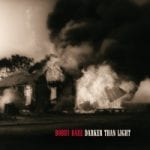Bobby Long: A Day In the Life
Bobby Long is fast asleep. He has neatly folded his lanky 6’2” frame onto a barely 5 foot couch. His signature mop of reddish brown hair covers his face. His breathing is deep and even, a far cry from his usual state of perpetual motion.
The young Brit has blown into town for a single show—a sold-out stopover at McCabe’s Guitar Shop, Los Angeles’ last bastion of folk music. He is en route to his first ever tour of Australia, but even this single day is not without its share of drama. He arrived from New York, where he has lived for over a year, exhausted and voiceless, prompting an anxious visit to a local ENT doctor whose treatment involved injections into a strategic part of the anatomy. Now, a few hours later, his voice and spirits are restored but he is spent, and the 20 precious minutes remaining before heading to soundcheck are given over to a much-needed catnap.
For Long this is an increasingly more rare solo performance. Since his debut CD A Winter Tale was released in February (visit www.bobbylong.info), he has been on the road non-stop backed by a band of seasoned musicians—Rich Hinman on pedal steel and guitar, Chris Morrisey on bass and backing vocals and Mark Stepro on drums and backing vocals—who also work with Ben Kweller and as their own performing unit.
In April of 2009, Long left London’s competitive open mic circuit behind and began touring the U.S. in a move to methodically build an audience for his music and, hence, a career. His initial audiences discovered him by way of a song he co-wrote that was sung by his actor friend Robert Pattinson in the blockbuster film Twilight. But his impassioned performances and superb songwriting quickly moved him to the head of the class among unsigned artists. By the time he inked a label deal with ATO Records, he had already played major festivals, cultivated supporters at radio and finished recording his album debut.
Recruiting Grammy winner Liam Watson to produce, he was pretty green to the recording process when he entered Watson’s all-analog Toe Rag Studios in London during a tour break in early 2010. Backed by session players, he emerged with 17 finished songs, editing the CD down to a taut 11 with bonus tracks galore for downloads and to flesh out the vinyl version. “We recorded everything live, like people used to do it,” he says. “In some ways, we’re trying to keep alive a dying art.” It has been well received by critics, and he is happy with the reaction so far. “It’s still early. It’s only been out for two months, and I want it to build slowly.”
His world-weary voice should belong to someone at least twice his 25 years, while his lyrics can be heartbreaking, yet enigmatic and elusive. He has created an enviable repertoire that could easily shape two more new albums as well as material for a book of poetry and free-form writings he wants to publish.
The McCabe’s announcer refers to Long’s earlier voice issues in his introduction, and seizing the opportunity to tease his attentive audience, Bobby whispers a greeting into the mike, feigning laryngitis, as he takes the stage. The resultant moans force him to immediately back-pedal, giving up the ruse to bask in warm applause.
The room is packed, with everyone seated on rows of folding chairs. In the early days of his touring, Long’s shows were mostly populated with fans under the spell of Twilight who jockeyed for position in front of the stage to record his every syllable on video or cellphone cameras while talking to each other (and to him) throughout the set. Tonight, you can hear a pin drop.
Seated on a stool cradling his Gibson J200, Bobby’s first two songs are “The Bounty of Mary Jane” and “Sick Man Blues” from A Winter Tale. Then he begins to mix it up, though even his unrecorded songs are largely familiar to the audience because he’s always adding new ones to his shows and posting them on MySpace. “I Give Her Love” is particularly affecting (“What will ever happen if I stop loving you/Until then I’ll be everything you need/I’ll carve your name in oak/And plant my heart’s first seed”); and a really new song called “Darling I Remember the Drink” elicits positive reaction.
“I Once Knew Her” is based on Albert Camus’ allegorical The Plague, highbrow stuff for one who clearly remembers being unengaged in school. “I was a pretty poor student,” he recounts. “I’ve always loved words, and I was always trying to use words in different ways, but I didn’t necessarily have the understanding. Most of my teachers just thought I wasn’t trying very hard.” Once he discovered literature—his tastes run from Dostoevsky to Dylan Thomas—his world view shifted.
And there was always music—Long has a deep-rooted affinity for American blues music, citing Mississippi John Hurt, Leadbelly and Robert Johnson among his influences. It’s obvious. He has borrowed a friend’s blues guitar for the show—a vintage National Resonator—on which plucks out the opening notes to “Dueling Banjos” from Deliverance, joking that he has just written that riff. But when he maneuvers a slide down the neck of the National, he reinvents his own “Penance Fire Blues” into a completely new song that would have made even Hurt take notice.
The performance is interwoven with tall stories and self-deprecating humor. He graphically describes the target of the doctor’s injections and offhandedly reveals that, en route to the show, the friend who was driving him rear-ended a pickup truck. The rapt audience reacts to every comment. They adore him. Throughout, that hair hangs in his face, obscuring his chiseled features and piercing eyes, as it performs a willful act of defiance against references to his model looks and heartthrob status. He would much prefer they listen than look, and perhaps because this audience actually listened so intently, he rewarded them by playing longer than planned.
The show behind him, he’s now focused on Australia where A Winter Tale has just been released to very positive notices. He will open for Rodrigo y Gabriela as well as do several solo shows, but he’s most excited about a new addition to the schedule. “I’m playing at the Byron Bay Blues Festival…with Bob Dylan.” He smiles broadly as he says it, contemplating the gravity of being on the same bill as one of his major influences, and one to whom he’s been favorably compared. “I own his entire catalogue,” he says. His Gibson J200, his weapon of choice, is similar to the one on the cover of Dylan’s iconic Nashville Skyline album.
Another influence he cites regularly is Leonard Cohen. Long saw him perform in London before America beckoned, and he was in the audience in Las Vegas last December when Cohen played the final show of his lengthy tour. He is partial to Cohen’s song “The Partisan,” which he admits inspired his own war saga, “Two Years Old,” yet it is his heartrending “A Stranger Song” that evokes Cohen’s imagery even more.
Faced with a rare day off, Long is flummoxed at the thought of no responsibilities beyond boarding his late-night flight to Oz. Back in New York, he might be watching soccer. He follows his beloved Manchester United and the rugby league team of his birthplace, the Wigan Warriors (he moved with his family to Wiltshire, where he grew up, when he was four), but after all, he’s in LA, and his wish for the day is unusual: to visit the grave of jazz trumpeter Jack Teagarden, who died in 1964. One of the few covers Long ever performs is the stunningly-beautiful “A Hundred Years From Today,” popularized by Teagarden in the 1930’s. He explains his broad musical tastes came largely by way of his father, who introduced him to Teagarden’s music as well as jazz and blues from an early age. It was also his dad who bought him his first guitar when he was 12. He claims he played “Smoke On the Water” on it, once, and put it away for the next five years. When he picked it up again, he was 17 and suddenly in a hurry to learn everything he could about playing it. The unusual fingerpicking style he developed was something he had watched his dad do.
Seated in the blazing California sun on the grass below Teagarden’s resting place, he places a call to his father in London to tell him where he is. He contemplates the inscription on the grave marker as he reads it out loud into the cellphone: “Where There is Hatred, Let Me Sow Love.” It seems the legacy of Jack Teagarden is in good hands.




